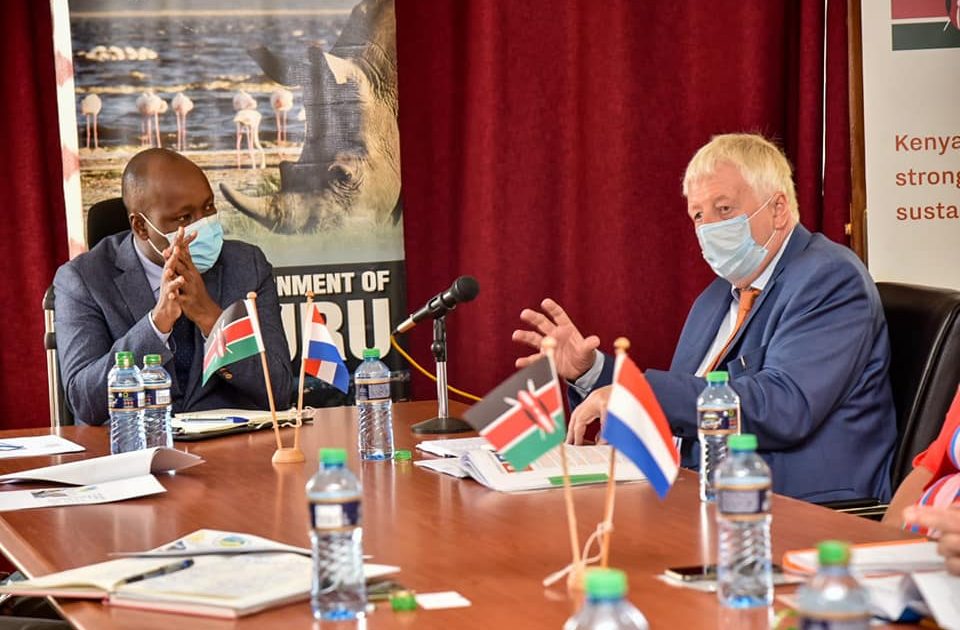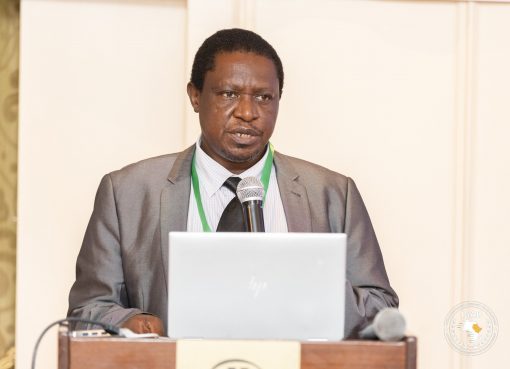The County government of Nakuru plans to strengthen its collaboration with the government of Netherlands in promoting new technologies and addressing shortage of certified seed in the potato sub sector.
Governor Lee Kinyanjui said while Kenya’s potato seed demand stands at 30,000 tonnes annually, the country only produces 6,700 tonnes, with most farmers recycling crop from the previous season to use as seed, a move he blamed for the shortage that the country faces.
Speaking in his office during a meeting with a delegation from Netherlands led by Amb. Maarten Brouwer, Mr Kinyanjui stated that scarcity of certified potato seeds in Kenya has stagnated production of the crop at seven tons per hectare against a potential of 40 tons.
“Only one per cent of potato farmers in the country use official seeds with the rest using recycled seeds from their farms and the informal sector thereby leading to low production of the crop. The County administration will collaborate with Netherlands in promoting new farming technologies for breeding multiple disease free and high yielding seed as a way of unlocking the over Sh15 billion potential of potato farming in the devolved unit,” added the County boss.
Also present were Deputy Governor Dr. Erick Korir, County Executive Committee Member for Agriculture, Fisheries and Livestock Dr. Immaculate Maina, her Water, Environment, Energy and Natural Resource counterpart Eng. Festus Ng’eno, Trade, Industry, Marketing and Tourism CEC Raymond Komen and County Attorney Caleb Nyamwange.
Amb. Brouwer observed that since 2012 the governments of Kenya and Netherlands have been partnering to facilitate importation of potato seed.
He said that Dutch government will provide technical assistance to the County’s department of agriculture to boost value addition in potatoes.
The envoy noted the partnership between the two countries has led to massive investments in the potato seed growing sector through mechanization, storage and crop management and disease control
Dr. Maina said her department was collaborating with Egerton University, The Kenya Plant Health Inspectorate Service (KEPHIS), Agricultural Development Corporation (ADC) and Kenya Agricultural and Livestock Research Organization (KALRO) in promoting new farming technologies for breeding multiple disease free potato seed in a bid to achieve a widespread take-off in productivity for the country’s potato farmers.
The department, the state agencies and the private sector, she stated, were working closely in encouraging both small holder and large scale farmers to adopt aeroponics, hydroponics and stem cutting technologies used to produce basic potato seed.
“The Big 4 agenda on Food Security targets a potato production of 2.5 million tons per annum which requires 500,000 tons of certified seed.
The current estimate of certified seed that is marketed is 5000 tons mainly produced by three large-scale seed growers. Kenya grapples with an estimated potato seed gap of 23,000 tons per annum,” noted Dr. Maina.
She observed that the country urgently needed an additional 800 hectares of seed production per year to achieve the targets under the Big 4 Agenda.
In February this year, Kenya applied for a Sh656 million grant from the International Fund for Agricultural Development (IFAD) to boost research on potato seed production and cut reliance on imports.
The fund will be used to increase the availability of certified seed in the country and cut the imports of tubers, which has been blamed for introducing foreign pests in the country. Currently, Kenya relies on Netherlands for importation of potato seed for production as the country hardly produces enough to be supplied to farmers.
According to Agriculture Principal Secretary Hamadi Boga Kenya only produces below two percent of the recommended seed and relies on countries like Tanzania to meet the Irish potatoes demand as the current variety that farmers grow does not meet the required quality for making food such as French fries.
The crop is grown by 600,000 to 800,000 farmers countrywide with a total production of 1 to 1.4 million tonnes worth Sh30 to Sh40 billion per year. Small scale farmers contribute 83 per cent of the total production.
The potato sub sector supports 3.8m people directly and indirectly with The National Potato Council of Kenya putting its worth at over Sh50billion.
The Alliance for a Green Revolution (AGRA) reports that on average only about 20 percent of farmers in Africa use seeds of improved varieties.
However, in the last two years, farmers who have used certified seeds have doubled their yields from two million to four million mega tonnes of cereals, soya beans and groundnuts, in monetary terms this has resulted to Sh220bn in incomes for the smallholder farmers.
By Anne Mwale




